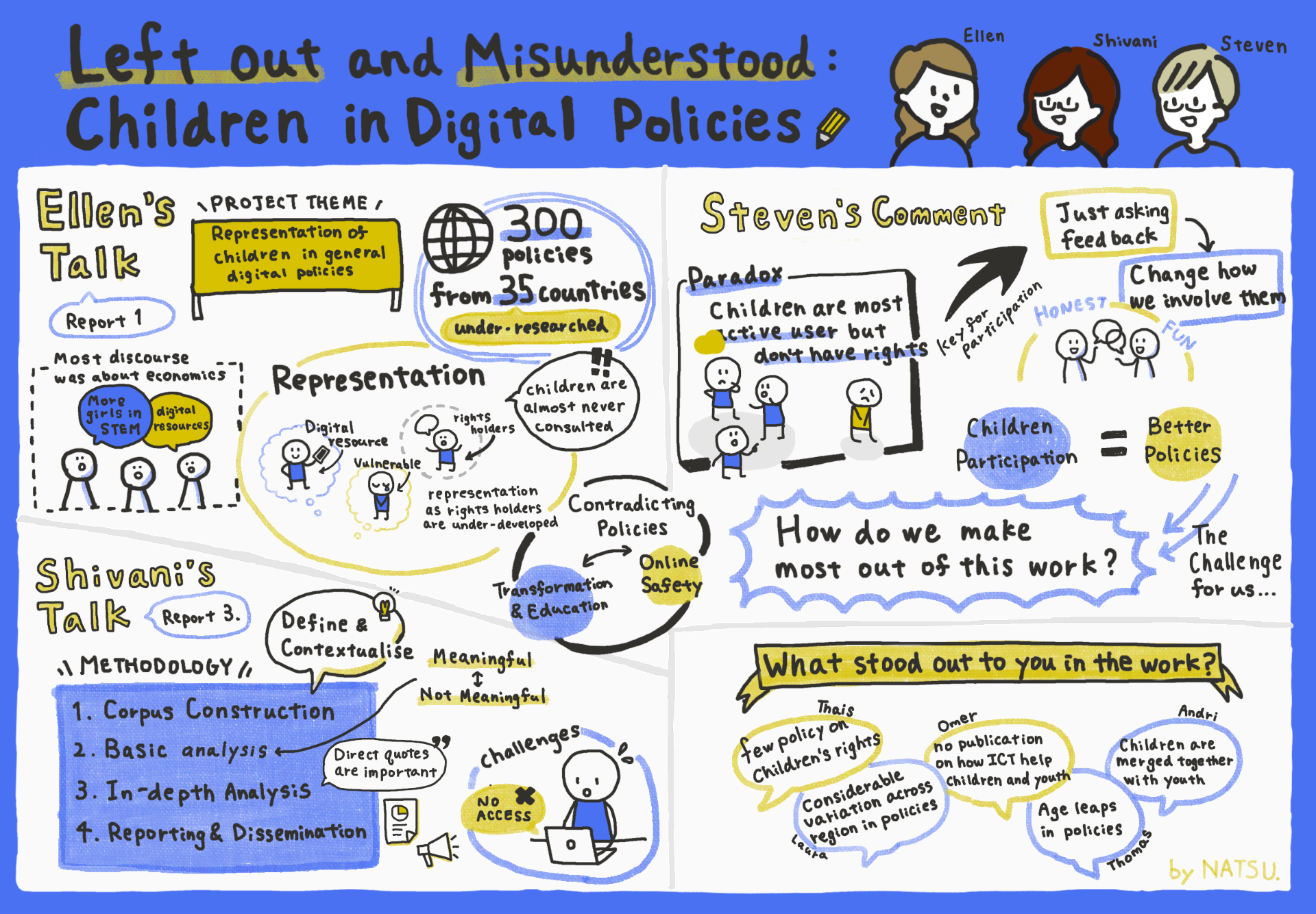This project examined the extent to which current digital policies consider children and their rights, and whether inequalities among children are taken into consideration.
This project analysed over 300 policies, with a particular focus on policies in understudied countries and regions.

The above digital sketch is based on the 2025 presentation of results: watch the launch of the findings.
Read about the project
The core aims of the project were to:
-
Analyse how children are presented in digital policies across different countries and regions, identifying best practices.
-
Assess what (if any) children's rights are considered and if inequalities amongst them are recognised.
-
Create a methodology (incl. conceptual framework, sampling, code book, analytical approach) that can be replicated for other countries and regions exempt from these reports.
-
Provide recommendations for policy makers and activist organisations on how policy might change to shape a better digital future for children.
All aims were met between the three published reports.
The research sourced digital policies, applied them to a coding framework and wrote up key learnings from each of the following countries, regional and intergovernmental organisations:
- Intergovernmental organisations: World Bank, OECD, UNESCO and UNICEF
- Africa: African Union, Angola, Mozambique, Niger, Nigeria, Senegal, South Africa, and Togo
- Asia: ASEAN, China, Hong Kong, India, Indonesia, Malaysia, and Taiwan
- Europe: European Union, France, Portugal, and the United Kingdom
- MENA: Kuwait, Saudi Arabia, United Arab Emirates, Egypt, and Sudan
- North America: Canada, and the United States
- South America: Comisión Económica Para América Latina (CEPAL), Bolivia, Brazil, Colombia, and Uruguay.
A coding and analytical framework was developed and published, which will enable other researchers to replicate this work in other countries and regions. A step by step guide can be found in the methodological toolkit.
- Inclusion matters: Consider children across policies Incorporate children as citizens with specific, indivisible rights
- Rights matter: Incorporate children as citizens with specific, indivisible rights
- Participation matters: Consult children in design and implementation
- Language matters: Take care with the terms ‘youth’ and ‘children’
- Context matters: Children with different lived experiences have different needs
- Scope matters: Broaden the range of stakeholders involved in policy delivery
- Accountability matters: Align goals, delivery mechanisms and key performance indicators (KPIs)
More information about our recommendations can be found in our global review report.
Outputs
Left out and misunderstood: children in digital policies. A global review
How are children are represented in digital policies around the world? Focussing on global patterns and good practice, this report provides an overview of how children are included and represented in policies in 30+ countries and intergovernmental organsiations (IGOs). Read the report.
Left out and misunderstood: children in global, regional and national digital policies
This report presents results from each investigated country, region and intergovernmental organisation (IGO) in an encyclopaedic format. Focussing on unique policy features, good practices and likely challenges for specific countries and governing bodies, the report provides excerpts to illustrate how policies work in practice in each country. Read the report.
Digital policy analysis: a methodological toolkit
The team have developed a step-by-step methodology guide. Any researcher or organisation may complete this research in another context, or with another population group. Read the report.
Meet the team
Project leads: Ellen J. Helsper and Shivani Rao
Several Research Assistants have supported this project. Without their invaluable work and support, this report would not have been possible.
Ghea Adasta-Fauzan, Omer Abdulhamid Gibreel, Laura Betancourt-Basallo, Thomas Cessou, Helen Ho, Malika Kaloo, Diego Martinez-Castro, Andri-Ridhiani Putri, Zayna Resley, Sramana Sabnam, Thais Sanches Cardoso, Ruofan Shi, Tham Truong, Tanishqa Vaish, Remi Waxman, Cong Xu, Hao Yun Yu and Marisa Lyons Longworth.
See the Digital Future for Children centre's other projects.